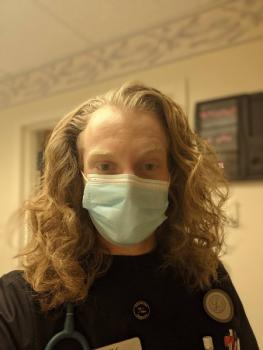Cristofori ’21M, MPH Aspires to Make Health Care More Accessible

By Katherine Haines ’21
Dual Master’s of Public Health and Medical Science Alex Cristofori ’21M, MPH has used his last year of graduate school to understand the current social unrest and global health crisis, and to reevaluate his own accountability as both an ally and a future medicine provider. “I got scared over the summer that I was going to be one of those white people who was performative and just jumped on the bandwagon while [anti-Black racism efforts were] convenient, and then I would lose sight of it,” said Cristofori. “One of the ways that I saw an opportunity to make sure that didn’t happen, especially because my program is getting more and more rigorous and I knew I was going to get pulled into my clinical year, was to get myself to be in a position where I was involved in these discussions regularly, where I was required and held accountable by my role.”
To do this, Cristofori became a part of the diversity committee for his graduate program and a peer mentor for the Living Our Values Experience (LOVE) Pilot Program, which is a space for Arcadia students, staff, and faculty to explore issues of identity, racism, and systemic discrimination, and to examine their own role within society as change agents.
“I felt so under-qualified because I had no idea what I was doing; I had never thought about race or diversity extensively before, my place in it, and how I identified,” said Cristofori. “The LOVE Pilot was the perfect place for me to turn inward and ask ‘Why am I doing this?’ and ‘Where do I fit as a puzzle piece into all this?’”
As vice president for the Student Academy of Physician Assistants (SAPA) class, Cristofori also is diversity chair. He leaned on what he learned as a peer mentor to help guide the diversity committee’s work in recognizing that students felt that discussions of race, inequality, and diversity in medicine were missing from their education in health care. To help with this, the committee hosted a panel of medical experts speakers who could speak to the issues of inequality in healthcare.
The committee aimed to provide a more comprehensive education to students outside of the classroom to be more effective healthcare providers after graduation. As he looks toward graduation and his career, Cristofori wants to take what he’s learned this year and apply it by working in emergency medicine.
“The emergency room provider is the gateway between people and medicine,” said Cristofori. “Sometimes they’re the only chance in years that people will have to get medical care. I think as an emergency care provider I will be able to care for people who need health care the most and who are unable to access care a lot of the time.”
Cristifori credits his experiences at Arcadia as helping him understand inequity in health care, and he hopes that he can work to combine primary care and emergency care to be a provider of both so people receive quality care for more than just immediate treatment.
“The emergency room has to meet the needs of the society for health care when health care systems fail,” said Cristofori. “The pandemic reaffirmed my interest and excitement to be in the field, and I realized how important the emergency room is for providing care for people who have disparities in health care.”


